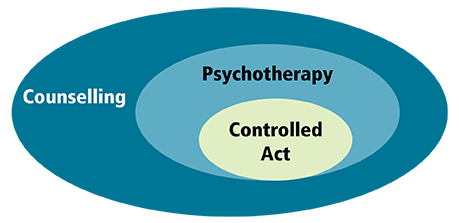Based on the RHPA definition, there are five elements in the controlled act. All five elements must be met for you to be performing the controlled act:
- You are treating a patient
- You are applying a psychotherapy technique
- You have a therapeutic relationship with the patient
- The patient has a serious disorder of thought, cognition, mood, emotional regulation, perception or memory
- This disorder may seriously impair the patient’s judgment, insight, behaviour, communication or social functioning
Nurses may perform elements of psychotherapy, but not the controlled act of psychotherapy. For example, if only four of the above components apply, you are not performing the controlled act.
You are in the best position to determine whether or not you are performing the controlled act according to the criteria.
The diagram below highlights that the controlled act is one element in the wide-ranging practice of counselling and psychotherapy. Many of the activities that nurses frequently engage in share some common traits with psychotherapy, but they are not psychotherapy. For example, activities such as health teaching, providing information, encouragement, support or instruction are not psychotherapy.
